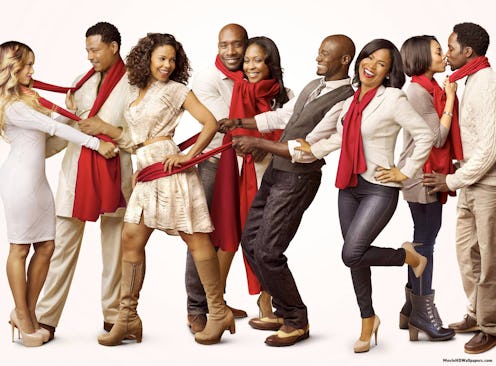Entertainment
How The Expectations Game Affects Black Filmmakers

Executives in charge of distribution at major movie studios (Universal, Fox, Disney, Warner Bros., etc.) nearly always low-ball their predictions regarding how much a given movie will make on its opening weekend. Why? Because it's a game of expectations: if studio executives knock their predictions down a few million (or billion, if we're talking Avatar), then they can say that the opening weekend exceeded their expectations. And "exceeding expectations" sounds good to stockholders and investors. Whether this is a good or ethical way of anticipating money made or lost is open for interpretation, but it's the way Hollywood does things.
The Best Man Holiday, the new Malcolm Lee Christmas film (yes, a Christmas film that opened before Thanksgiving) that is a sequel to Lee's 1999 The Best Man, opened last weekend and grossed $30.6 million. Nikki Rocco, president of distribution for Universal, said in an interview with the L.A. Times that her prediction was that the movie would gross in the high teens and that, even in her least-lucid moment, she wouldn't have been able to hallucinate a $30.6 million opening weekend. That's surprising coming from the person who, in the words of Linda Holmes at NPR, "would theoretically be best positioned to hallucinate" that outcome.
What does this mean for the "expectations game"? It means that (mostly white, mostly old, mostly male) studio executives consistently underestimate how movies with a majority Black cast aimed at a majority Black audience (or a majority female cast aimed at a majority female audience, see Bridesmaids) are going to do at the box office. It means that The Best Man Holiday is exceeding expectations in the same year that The Butler (taking in over $100 million, though it somehow escaped the expectations game, at least in part) and 12 Years A Slave (the critics' darling) exceeded expectations. It means that TBMH is exceeding expectations the year after Think Like A Man had a $33 million opening weekend and went on to make $91 million. It means that Franklin Leonard could not have been more right on when he tweeted:
“So are we calling The Best Man Holiday yet another overperforming Black film or are we ready to admit that the model is wrong?”
The model is wrong. Hollywood needs to rethink how they treat Black filmmakers, Black actors, and, most importantly, Black audiences.
The best part about all of this is that The Best Man Holiday isn't a film about race. It's a film about Christmas. It's a film about religion. It's a film about relationships and friendships and reunion. Actually, it sounds like a blockbuster. If it had an all-star, well-known white cast instead of an African American one, it probably would have been expected to clean up at the box office. But, it doesn't. It has some huge names, arguably some of the most famous Black actors currently working (Taye Diggs, Monica Calhoun, Regina Hall, Nia Long, Terence Howard). But that's not enough. In Hollywood's eyes, The Best Man Holiday is a "Black film" aimed at a niche audience, not a mainstream film that deserves mainstream expectations for its earning potential.
Therein lies the rub. Until Hollywood starts accepting that audiences are willing and eager to watch people who aren't white onscreen, they will continue to expect nothing from great movies that are written, directed, or filled with people who don't look like the on-screen norm of 50 years ago. They will continue to label those movies as "overperforming", which is another way of saying "unexpected".
The good news: if Hollywood isn't taking notice, the media finally is. They are on to the "expectations game" and how detrimental it is both to people of color trying to live and work in the film industry, and to the industry itself. The L.A. Times, Forbes, TIME, and NPR have all published pieces on the subject. One can only hope we're at the forefront of a pop culture revolution, one that will give more men and women of color a chance to write, direct, produce, and act in big-budget, substantive films with corresponding expectations.